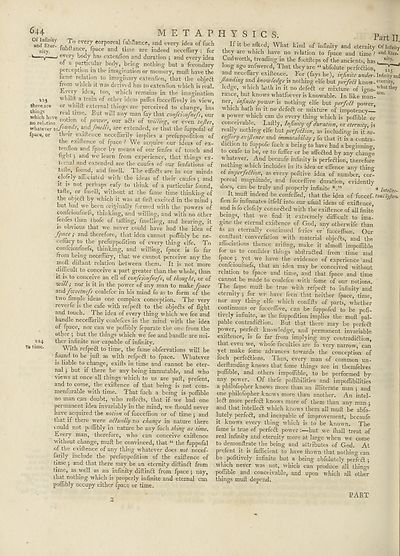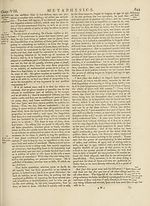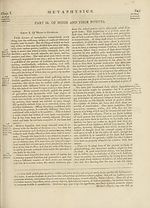Encyclopaedia Britannica, or, a Dictionary of arts, sciences, and miscellaneous literature : enlarged and improved. Illustrated with nearly six hundred engravings > Volume 13, MAT-MIC
(690) Page 644
Download files
Complete book:
Individual page:
Thumbnail gallery: Grid view | List view

Of Infinity
and Eter¬
nity.
**3
there are
things
6++ M E T A P
To every corporeal fubitance, and every idea of fuch
fubfiance, fpace and time are indeed neceflary : for
every body has extenfion and duration ; and every idea
of a particular body, being nothing but a feeondary
perception in the imagination or memory, mull have the
fame relation to imaginary extenfion, that the objedt
fiom which it was derived has to extenfion which is real.
Every idea, too, which remains in the imagination
Avhilil a train of other ideas pafles fucceflively in view,
or whilft external things are perceived to change, has
which h ve rea^ ^1Tie* will any man fay that cotifcioufnefs, our
no relation* 1lot*on Power, our acts of willing, or even tujles,
whatever tofoun/iS'> and/wd’/Zj’, are extended, or that the fuppofal of
fpace, or their exiftence neceffariiy implies a prefuppofition of
the exiftence of fpace ? We acquire our ideas of ex¬
tenfion and fpace by means of our fenfes of touch and
fight ; and we learn from experience, that things ex¬
ternal and extended are the caufes of our fenfations of
tade, found, and fmell. The effects are in our minds
clofely affociated with the ideas of their caufes 5 and
it is not perhaps ealy to think of a particular found,
tafte, or fmell, without at the fame time thinking of
the objett by which it was at firft excited in the mind ;
but had we been originally formed with the powers of
confeioufnefs, thinking, and willing, and with no other
fenfes than thole of tailing, fmelli-ng, and hearing, it
is obvious that we never could have had the idea of
/pace / and therefore, that idea cannot poffibly be ne-
eeffary to the prefuppofition of every thing elfe. To
confeioufnefs, thinking, and willing, fpace is fo far
from being neceffary, that we cannot perceive any the
moll dillant relation between them. It is not more
difficult to conceive a part greater than the whole, than
it is to conceive an ell of confeioufnefs, of thought, or of
will; nor is it in the power of any man to make fpace
fweetnefs coalefce in his mind fo as to form of the
two Ample ideas one complex conception. The very
reverfe is the cafe with refpeft to the objedls of fight
and touch. The idea of every thing which we fee and
handle neceffariiy coalefces in the mind with the idea
of fpace, nor can we poffibly feparate the one from the
other ; but the things which we fee and handle are nei¬
ther infinite nor capable of infinity.
With refpedt to time, the fame obfervations will be
found to be juft as with refpe£t to fpace. Whatever
is liable to change, exifts in time and cannot be eter¬
nal ; but if there be any being immutable, and rvho
views at once all things which to us are pall, prefent,
and to come, the exiftence of that being is not com-
menfurable with time. That fuch a being is poffible
no man can doubt, who refleas, that if we had one
permanent idea invariably in the mind, we Ihould never
have acquired the notion of fucceffion or of time ; and
that it there were actually no change in nature there
could not poffibly in nature be any fuch thing as time.
Every man, therefore, who can conceive exiftence
w ithout change, mull be convinced, that “ the fuppofal
of the exiftence of any thing whatever does not necef¬
fariiy include the prefuppofition of the exiftence of
time ; and that there may be an eternity diftina from
time, as well as an infinity diftina from fpace 5 nay,
that nothing which is properly infinite and eternal can
poffibly occupy either fpace or time,
224
time.
H Y S I C S. Part II.
Ifitbeafked, What kind of infinity and eternity Of Infinity
they are which have no relation to fpace and time ? and Eter-
Cudworth, treading in the footfteps of the ancients, has , n‘ty'
long ago anfwered, That they are “ abfolute perfbaion, hZT*
and neceffary exiftence. For (fays lie), infinite under- Infinity and
funding and knowledge is nothing elfe but perfect know-eternity,
ledge, xvhich hath in it no defea or mixture of igno-
ranee, but knows whatfoever is knowable. In like man-aie"
ner, infinite power is nothing elfe but perfect power,
which hath in it no defea or mixture of impotency ^
a power which can do every thing which is poffible or
conceivable. Laftly, Infinity of duration, or eternity, is
really nothing elfe but perfcSlion, as including in it ne¬
ceffary exifence and immutability ; fo that it is a contra-
diaion to fuppofe fuch a being to have had a beginning,
to ceafe to be, or to fuffer or be affeaed by any change
whatever. And becaufe infinity is perfeaion, therefore
nothing which includes in its idea or effence any thing
of imperfeliion, as every pofitive idea of number, cor¬
poreal magnitude, and fucceffive duration, evidently
does, can be truly and properly infinite * Intelkc-
It muft indeed be confefied, that the idea of fuccef- tualSyjlem.
fion ft) in fin nates itfelf into our ufual ideas of exiftence,
and is fo clofely conneaed w ith the exiftence of all finite
beings, that wre find it extremely difficult to ima¬
gine the eternal exiftence of God, any otherwife than
As an eternally continued feries or fucceffion. Our
con ft ant converfation with material objeas, and the
affociations thence arifing, make it almoft impoffible
for us to confider things abftraaed from time and
fpace j yet we have the evidence of experience' and
confeioufnefs, that an idea may be conceived without
relation to fpace and time, and that fpace and time
cannot be made to coalefce with fome of our notions.
The fame muft be true with refpea to infinity and
eternity ; for are have feen that neither fpace, time,
nor any thing elfe which eonfifts of parts, whether
continuous or fucceffive, can be fuppofed to be pofi-
tively infinite, as the fuppofition implies the moft pal¬
pable contradiaion. But that there may be perfea
power, perfea knowledge, and permanent invariable
exiftence, is fo far from implying any contradiaion,
that even we, Avliole faculties are fo very narrow, can
yet make fome advances towards the conception of
fuch perfeaions, .thus, every man of common un¬
demanding knows that fome things are in themfelves
poffible, and others impoffible, to be performed by
any power. Of thefe poffibilities and impoffibilities
a philosopher knows more than an illiterate man ; and
one philofopher knows more than another. An intel-
ka more perfea knows more of them than any man j
and that intelka which knows them all muft be abfo-
lutely perfea, and incapable of improvement, becaufe
it knows every thing which is to be known. Tire
fame, is true of perfea power :—but we ffiall treat of
real infinity and eternity more at large when we come
to demonftrate the being and attributes of God. At
prefent it is fufficient to have ftiown that nothing can
be pofitively infinite but a being abfolutely perfea ;
which never was not, which can produce all things*
pofiible and conceivable, and upon which all other
things muft depend.
PART
and Eter¬
nity.
**3
there are
things
6++ M E T A P
To every corporeal fubitance, and every idea of fuch
fubfiance, fpace and time are indeed neceflary : for
every body has extenfion and duration ; and every idea
of a particular body, being nothing but a feeondary
perception in the imagination or memory, mull have the
fame relation to imaginary extenfion, that the objedt
fiom which it was derived has to extenfion which is real.
Every idea, too, which remains in the imagination
Avhilil a train of other ideas pafles fucceflively in view,
or whilft external things are perceived to change, has
which h ve rea^ ^1Tie* will any man fay that cotifcioufnefs, our
no relation* 1lot*on Power, our acts of willing, or even tujles,
whatever tofoun/iS'> and/wd’/Zj’, are extended, or that the fuppofal of
fpace, or their exiftence neceffariiy implies a prefuppofition of
the exiftence of fpace ? We acquire our ideas of ex¬
tenfion and fpace by means of our fenfes of touch and
fight ; and we learn from experience, that things ex¬
ternal and extended are the caufes of our fenfations of
tade, found, and fmell. The effects are in our minds
clofely affociated with the ideas of their caufes 5 and
it is not perhaps ealy to think of a particular found,
tafte, or fmell, without at the fame time thinking of
the objett by which it was at firft excited in the mind ;
but had we been originally formed with the powers of
confeioufnefs, thinking, and willing, and with no other
fenfes than thole of tailing, fmelli-ng, and hearing, it
is obvious that we never could have had the idea of
/pace / and therefore, that idea cannot poffibly be ne-
eeffary to the prefuppofition of every thing elfe. To
confeioufnefs, thinking, and willing, fpace is fo far
from being neceffary, that we cannot perceive any the
moll dillant relation between them. It is not more
difficult to conceive a part greater than the whole, than
it is to conceive an ell of confeioufnefs, of thought, or of
will; nor is it in the power of any man to make fpace
fweetnefs coalefce in his mind fo as to form of the
two Ample ideas one complex conception. The very
reverfe is the cafe with refpeft to the objedls of fight
and touch. The idea of every thing which we fee and
handle neceffariiy coalefces in the mind with the idea
of fpace, nor can we poffibly feparate the one from the
other ; but the things which we fee and handle are nei¬
ther infinite nor capable of infinity.
With refpedt to time, the fame obfervations will be
found to be juft as with refpe£t to fpace. Whatever
is liable to change, exifts in time and cannot be eter¬
nal ; but if there be any being immutable, and rvho
views at once all things which to us are pall, prefent,
and to come, the exiftence of that being is not com-
menfurable with time. That fuch a being is poffible
no man can doubt, who refleas, that if we had one
permanent idea invariably in the mind, we Ihould never
have acquired the notion of fucceffion or of time ; and
that it there were actually no change in nature there
could not poffibly in nature be any fuch thing as time.
Every man, therefore, who can conceive exiftence
w ithout change, mull be convinced, that “ the fuppofal
of the exiftence of any thing whatever does not necef¬
fariiy include the prefuppofition of the exiftence of
time ; and that there may be an eternity diftina from
time, as well as an infinity diftina from fpace 5 nay,
that nothing which is properly infinite and eternal can
poffibly occupy either fpace or time,
224
time.
H Y S I C S. Part II.
Ifitbeafked, What kind of infinity and eternity Of Infinity
they are which have no relation to fpace and time ? and Eter-
Cudworth, treading in the footfteps of the ancients, has , n‘ty'
long ago anfwered, That they are “ abfolute perfbaion, hZT*
and neceffary exiftence. For (fays lie), infinite under- Infinity and
funding and knowledge is nothing elfe but perfect know-eternity,
ledge, xvhich hath in it no defea or mixture of igno-
ranee, but knows whatfoever is knowable. In like man-aie"
ner, infinite power is nothing elfe but perfect power,
which hath in it no defea or mixture of impotency ^
a power which can do every thing which is poffible or
conceivable. Laftly, Infinity of duration, or eternity, is
really nothing elfe but perfcSlion, as including in it ne¬
ceffary exifence and immutability ; fo that it is a contra-
diaion to fuppofe fuch a being to have had a beginning,
to ceafe to be, or to fuffer or be affeaed by any change
whatever. And becaufe infinity is perfeaion, therefore
nothing which includes in its idea or effence any thing
of imperfeliion, as every pofitive idea of number, cor¬
poreal magnitude, and fucceffive duration, evidently
does, can be truly and properly infinite * Intelkc-
It muft indeed be confefied, that the idea of fuccef- tualSyjlem.
fion ft) in fin nates itfelf into our ufual ideas of exiftence,
and is fo clofely conneaed w ith the exiftence of all finite
beings, that wre find it extremely difficult to ima¬
gine the eternal exiftence of God, any otherwife than
As an eternally continued feries or fucceffion. Our
con ft ant converfation with material objeas, and the
affociations thence arifing, make it almoft impoffible
for us to confider things abftraaed from time and
fpace j yet we have the evidence of experience' and
confeioufnefs, that an idea may be conceived without
relation to fpace and time, and that fpace and time
cannot be made to coalefce with fome of our notions.
The fame muft be true with refpea to infinity and
eternity ; for are have feen that neither fpace, time,
nor any thing elfe which eonfifts of parts, whether
continuous or fucceffive, can be fuppofed to be pofi-
tively infinite, as the fuppofition implies the moft pal¬
pable contradiaion. But that there may be perfea
power, perfea knowledge, and permanent invariable
exiftence, is fo far from implying any contradiaion,
that even we, Avliole faculties are fo very narrow, can
yet make fome advances towards the conception of
fuch perfeaions, .thus, every man of common un¬
demanding knows that fome things are in themfelves
poffible, and others impoffible, to be performed by
any power. Of thefe poffibilities and impoffibilities
a philosopher knows more than an illiterate man ; and
one philofopher knows more than another. An intel-
ka more perfea knows more of them than any man j
and that intelka which knows them all muft be abfo-
lutely perfea, and incapable of improvement, becaufe
it knows every thing which is to be known. Tire
fame, is true of perfea power :—but we ffiall treat of
real infinity and eternity more at large when we come
to demonftrate the being and attributes of God. At
prefent it is fufficient to have ftiown that nothing can
be pofitively infinite but a being abfolutely perfea ;
which never was not, which can produce all things*
pofiible and conceivable, and upon which all other
things muft depend.
PART
Set display mode to:
![]() Universal Viewer |
Universal Viewer | ![]() Mirador |
Large image | Transcription
Mirador |
Large image | Transcription
Images and transcriptions on this page, including medium image downloads, may be used under the Creative Commons Attribution 4.0 International Licence unless otherwise stated. ![]()
| Permanent URL | https://digital.nls.uk/192693017 |
|---|
| Attribution and copyright: |
|
|---|
| Description | Ten editions of 'Encyclopaedia Britannica', issued from 1768-1903, in 231 volumes. Originally issued in 100 weekly parts (3 volumes) between 1768 and 1771 by publishers: Colin Macfarquhar and Andrew Bell (Edinburgh); editor: William Smellie: engraver: Andrew Bell. Expanded editions in the 19th century featured more volumes and contributions from leading experts in their fields. Managed and published in Edinburgh up to the 9th edition (25 volumes, from 1875-1889); the 10th edition (1902-1903) re-issued the 9th edition, with 11 supplementary volumes. |
|---|---|
| Additional NLS resources: |
|

